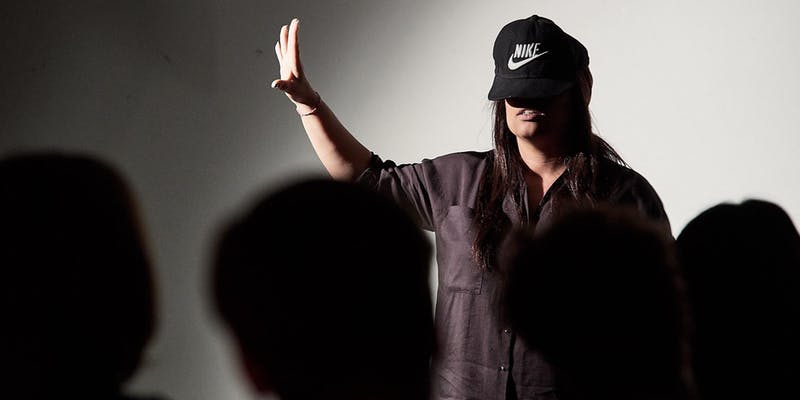Luke Buffini, an MA Philosophy Student at Birkbeck and co-founder of Lamplight Magazine, reviews the performances shown as part of Arts Week 2019’s Theatre Scratch Night event.
The moment an actor stops taking the situation seriously is simultaneously the moment they are finished being funny. This is not the same as taking acting seriously, or one’s idols, audience or reviews seriously (the last of which always have an inherent silliness to them – except this one of course). These would all be mistakes to the actor, whose very beating heart is her enthusiasm for play. Yet what an actor simply must do to begin with is take every character’s situation with wholehearted seriousness. Without this, nothing interesting or even dramatic can happen, the latter being the stupider and easier to seduce younger sibling of comedy. No matter the silliness or boredom written into the situation, the actor when on stage – that is, the character – must fail to see these things. Every triviality contains the potential for revelation. Each silence, each exchange of eyes is a vertebra in the spine of the story. That’s acting; that’s theatre.
This is a lesson that most of the actors at the Birkbeck Theatre Scratch Night have not yet learned. Victor Mellors and peers were the happy exception to this. Their sketch was a short farce about two politicians stuck in a utility cupboard during the consummation of their election race. It was revealingly similar to another: a post-apocalyptic comedy about two friends trapped in an underground bunker. Both claustrophobic duologues (essentially), inflicted with the absurd and displaying the boredom and frustration of their characters. One ends in reconciliation, the other in confrontation. The defining difference is that Mellors and company do not allow their characters to perceive the absurdity of their situation. They behave with perfect and unironic seriousness in a situation the audience knows to be silly. This moment, for the characters, is the defining one of their lives and they’re spending it in a utility cupboard, amongst the buckets and disinfectant. At one point, Mellors somehow made a throwaway line about ‘having fun with this mop’ into a huge laugh. Here was the reliable convention, the one which mines comedy from seriousness, flaunting itself again.
Once the theatre fledglings had dispersed we were given something by their filmmaking counterparts. First, a short film called Next Floor, by French-Canadian director Denis Villeneuve, was screened, followed by two student adaptations. The Villeneuve was magnificent, with a masterful balance of disgust, absurd humour, political metaphor and beauty. A handful of waiters are scurrying an enormous carnivorous banquet to and forth for a seemingly insatiable group of diners. With increasing frequency, the swelling bellies of the consumers and the piling hoard on the table cause the floor to collapse, sending the banquet down a floor, on which the whole routine resumes. It’s a fantastic allegory for the uniquely stupid and repugnant greed of our age. All readers should spare the 10 minutes or so to watch it. (One student remarked to me afterwards that he had at first thought the Villeneuve was a student production, and was preparing in mind a complaint to the university about budget limits and equality.)
One student adaptation was a touch on the literal side. It edited horrid images of chickens living in disgraceful conditions between bits of the Villeneuve. A true but limited interpretation. Another adaptation I thought more ambitious. That one aroused broader reflections: about capitalism, climate change, environmental plunder and more broadly the shameful state in which blind, relentless growth and competition has placed us. It can only be promising that the artists of tomorrow are treating this frightening dilemma with the critical gaze it demands.
